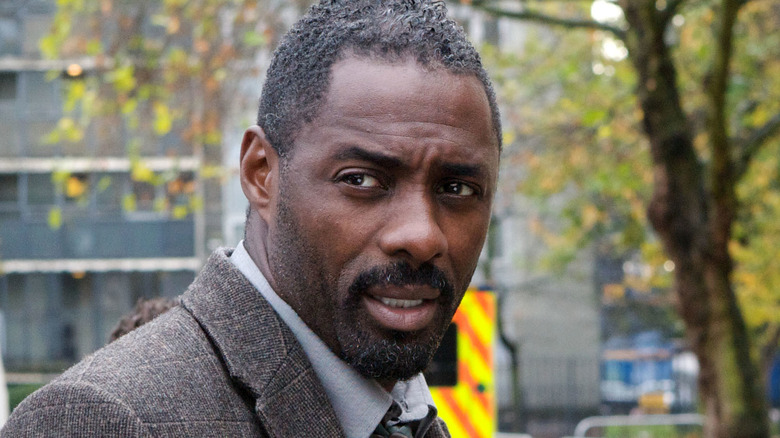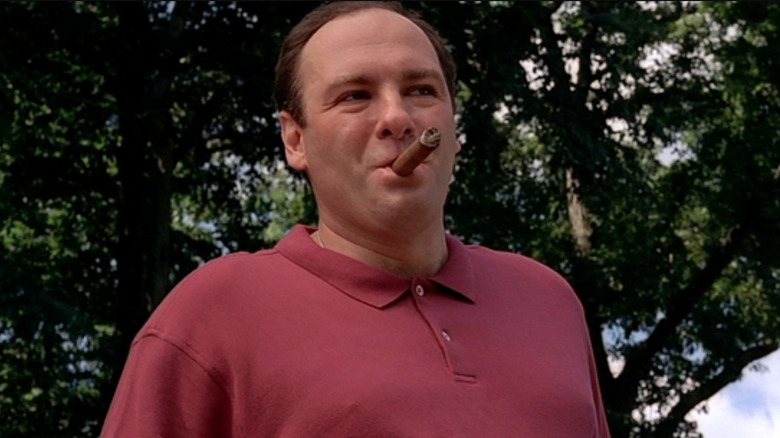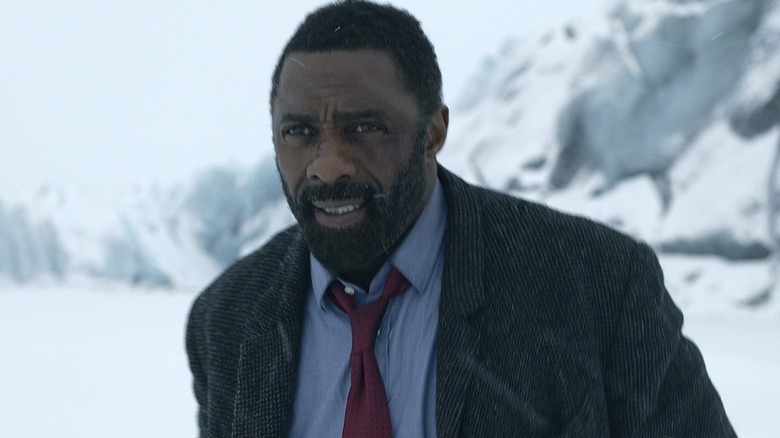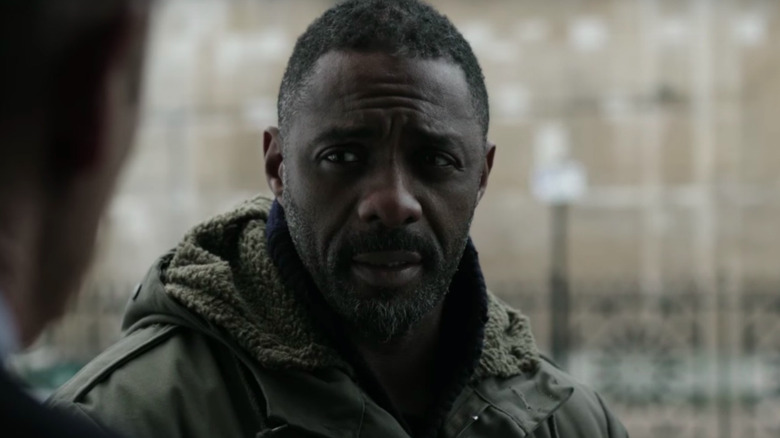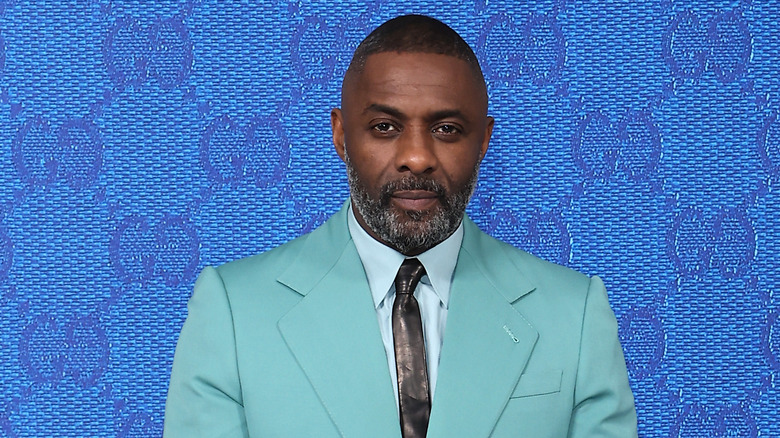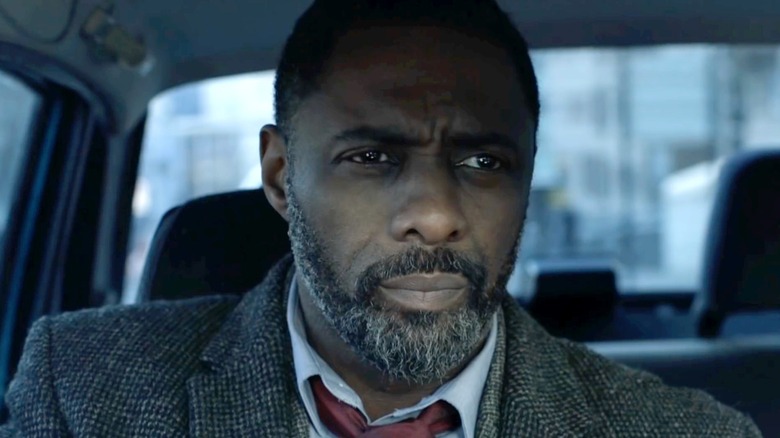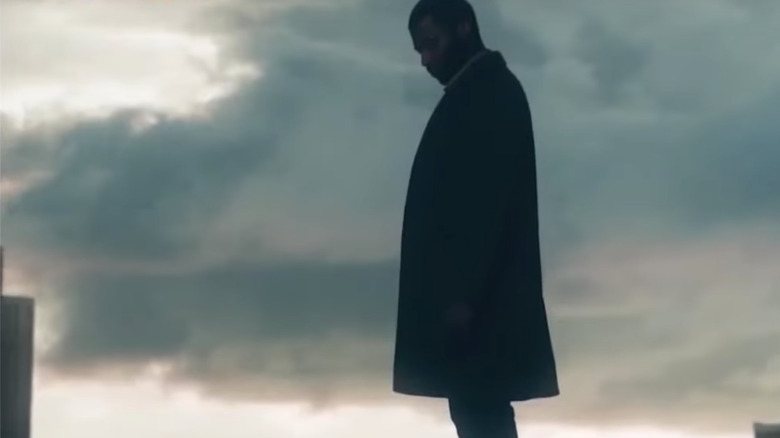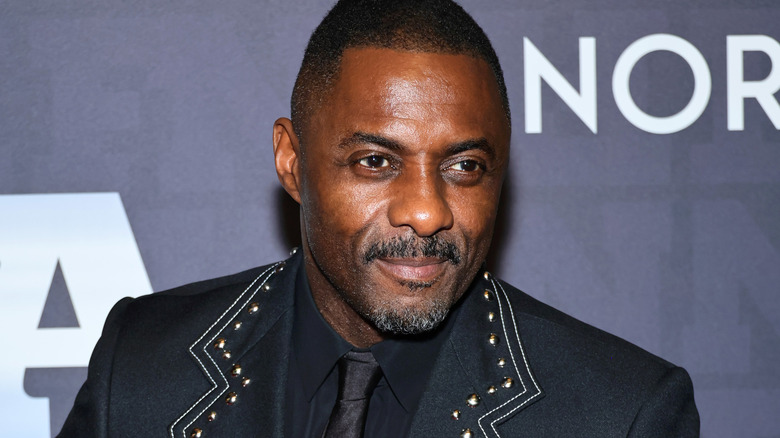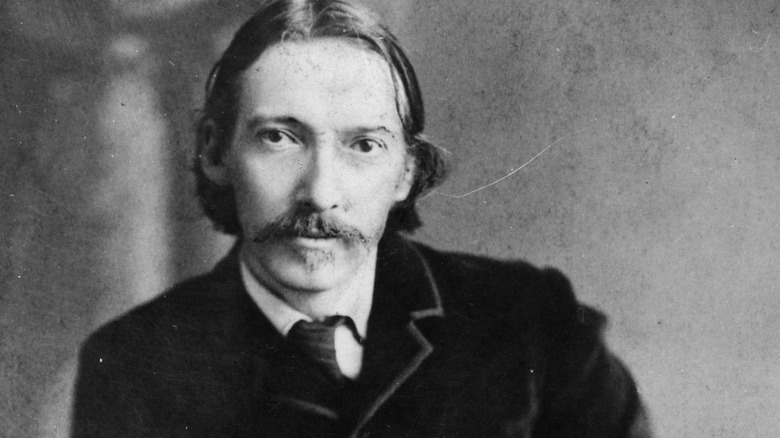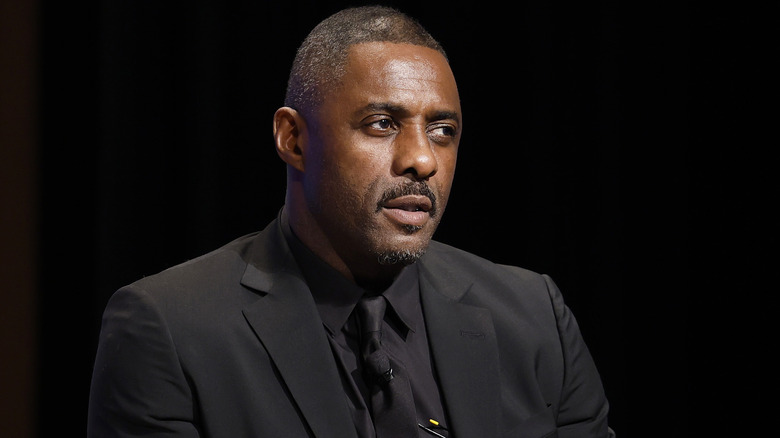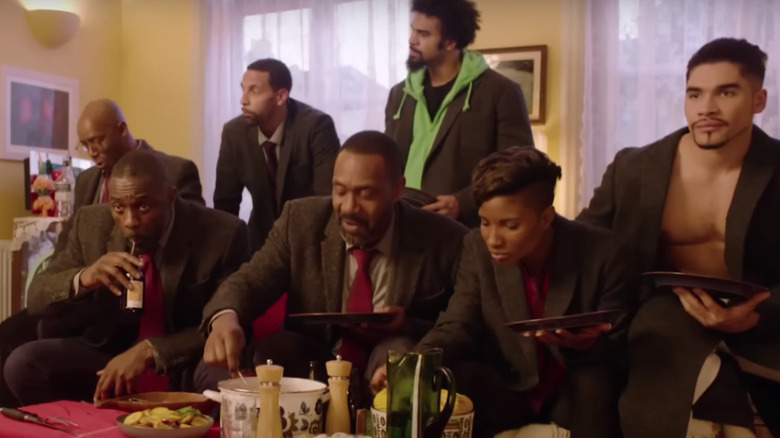12 Luther Facts That Will Leave You Saying 'Now What?'
We may receive a commission on purchases made from links.
When it premiered on the BBC in 2010, "Luther" took the procedural cop show genre and flipped it on its head. The series was created in part as a rebuttal to the numerous "CSI"-type shows that dominated the airwaves at the time and were beginning to feel stale. Rather than following a group of law officers and relishing in their high-tech crime solving methods, "Luther" focused in on the grounded anti-hero stylings of a single tormented detective.
The central performance from Idris Elba is a big part of the reason why "Luther" works so well. His star-power in both the U.K. and the U.S. brought international attention to the series, and the sharp scripts from series creator Neil Cross, who wrote every single episode, ensured that the series became a high watermark for its genre. Utilizing a considerably darker tone than the average cop show, the crimes of each episode's perpetrators are often pushed past standard villainy and into genuinely disturbing territory.
From one-off baddies to recurring characters, the entire supporting cast turns in strong work, but none more impressive than Ruth Wilson in the pivotal role of Alice Morgan, the sociopathic killer to which Luther can't help but be drawn. As Elba revisits the role for the feature film continuation "Luther: The Fallen Sun," here are some facts about the original series worth looking into.
A prequel was released as a novel
Before becoming a television writer for "MI-5" (which is known as "Spooks" in the U.K.) and later creating "Luther," Neil Cross first led a successful career as a novelist. Cross has written several novels, and his book "Mr. In-Between" was adapted for the big screen years before he himself became a screenwriter. While "Luther" was not an adaptation of one of Cross's novels, he did write a prequel novel that was published one year after the 2010 premiere of the series premiered on the BBC.
The first episode of "Luther" opens with the titular character pursuing a child-abductor/murderer through an abandoned factory and making the controversial decision to let him fall (he ends up in a coma) when he could have saved and arrested him. The following year, Cross released the novel "Luther: The Calling" as a prequel to the show. The book covers the events of the investigation into the abductor/murderer from the pilot episode. The two flow smoothly into one another, as the novel concludes right where the first episode of the show begins.
The novel delves into the backstory and methods of the criminal, how Luther came to catch him, and the exact reason why Luther made his fateful decision at the beginning of the series. A second book, titled "Luther: The Burning," was announced shortly after the "The Calling" was published but it was never released; nevertheless, several people have rated it on Goodreads.
Luther wouldn't exist without The Sopranos
There was a time when "Luther" creator Neil Cross would have stuck with novels and not been interested in writing television, and that time was before "The Sopranos" hit HBO in 1999.
"The Sopranos was year zero in as much as it was approached by its audience in the same way as a Dickens part-work was approached by its audience," Cross told Televisual. inn 2014. "[It was] a big, long, fat story eaten up in chunks." Before "The Sopranos" changed everything, Cross had considered the book and television mediums too disparate for his particular talents to translate satisfactorily.
A second show that opened the eyes of Cross was "The Wire," which landed on HBO three years later. Of course, "The Wire" represented the breakthrough role for Idris Elba, who starred in the show's first three seasons as the unforgettable, ruthlessly studious Stringer Bell. With those two HBO programs convincing him that his background as an author could work on the small screen, Cross made the plunge into the new medium. He earned his first teleplay credits for "Spooks" (aka "MI-5"), then co-created the short-lived series "The Fixer" for ITV in 2008 before finding breakthrough success with "Luther" in 2010.
The Luther film has been in the works for a decade
"Luther: The Fallen Sun" finally received its release in 2023, but the film has been in the works in one form or another for an entire decade. Deadline first reported on a "Luther" film all the way back in 2013.
Even at that early stage, the notion had already been gestating for a while, with Cross saying, "We've hoped to turn Luther into a movie for a long time." It is clear that the "Luther" film plans have changed considerably over the years. The project was first announced as a prequel that would link back up to the opening of the pilot episode. By the sounds of it, this first incarnation of the film may have been a direct adaptation of Cross's prequel novel "Luther: The Calling."
At the time Cross spoke to Deadline, he said they hoped to go into production the following year. When the following year rolled around, the status of the film hadn't moved any further. Cross gave an interview with Televisual in 2014 in which he confirmed the project was still in the works and that, "There will be news soon." This didn't end up being the case, and the rest of the decade would go by with no further progress being made. Elba's star, meanwhile, considered to soar, and his increasingly packed schedule made planning and executing a "Luther" film even more of a challenge.
Elba did, however, stay connected to the character with additional installments of the television series. Today, "Luther: The Fallen Sun" serves not as a prequel, but as a continuation of the series set after the events of its finale.
The marketing almost killed the series right away
In the time before the first season of "Luther" aired, the marketing of the series gave many U.K. viewers a misleading impression. Rather than accurately depicting the style, tone, and nature of the grim series, the ads made it look like something akin to "Lewis," its progenitor "Inspector Morse" and other popular detective shows. "Luther" was made to look similarly light in tone, focused more on the investigation and mystery.
In actuality, "Luther" was far more character-driven and dark — so dark, in fact, some might say it slipped into horror territory from time to time. The series also broke genre formula by frequently revealing the identity of the criminal before the protagonist could figure it out.
"The audience was baffled and switched off in hundreds of thousands," Cross told The Sunday Post in 2020, blaming the BBC for such mis-marketing. But in the same interview, Cross was quick to credit the BBC for giving the series enough time to recover and find its audience. "Today," he said, "we would be cancelled."
Idris Elba lost himself in the Luther character
Alongside Stringer Bell from "The Wire," DCI John Luther is perhaps the character most closely linked with Idris Elba. Having first played the role in 2010 and returning to it time and again, Luther is by the far longest lasting individual character Elba has played, so it makes sense that Luther is the character Elba finds himself most likely to get lost in.
In a BBC One promotional video for the third season of "Luther," Elba said, "I love playing him, but he's so absorbing that sometimes, you know, it's hard to kind of like separate Idris from Luther."
It doesn't help that Elba is quite similar to the character; speaking to Esquire in 2023, Elba described Luther as, "Probably the character that's most like me, in real life." Though he doesn't have any experience as a detective, Elba says he does have a similar personality, making it difficult to slip back out of character when shooting has wrapped.
"The mood of the piece that I'm working with really sticks with me," he said in a 2012 interview.
The show was supposed to end after Series 3
"Luther" has always been defined by long-dormant stretches, owing primarily to Elba's jam-packed schedule as an in-demand movie star. A couple of years went past between what are called "Series 3" and "Series 4," for instance; when the show resumed, it had changed drastically, now with only two episodes per series, rather than the previous four to six. The reason for this extended gap was because, at first, Series 3 was designed to be the conclusion of the show.
As the schedule grew even more sporadic, the show continued for two additional series over the course of the next six years, with the "Luther: The Fallen Sun" movie arriving about four years after the final series aired. The reason why "Luther" returned after its intended finale was simple: Elba and Cross missed the character.
"The truth is that we both missed it almost immediately," Cross told IndieWire. "Pretty much, as soon as it was wrapped." After the conclusion of the show, he and Elba made plans over text message to make more — while Elba was at an Awards show and Cross saw him mention "Luther" on camera while walking the red carpet. Though Cross created the character and wrote multiple episodes in advance of Elba being cast in the role, he describes the two as having equal ownership of DCI John Luther: "Idris and I have joint custody of the character."
Luther was remade around the world
After the final series of the "Luther" TV show but before the release of the "Luther: The Fallen Sun" movie, there was another "Luther" project released. In 2021, the original BBC show was adapted and remade in France for the TFI television network. Taking over Elba's role was Christopher Bayemi, and the character's full name was changed from John Luther to Théo Luther. And the French version of "Luther," surprisingly, is just one in a number of international adaptations.
A Russian version of "Luther" hit the air in 2016 under the title "Klim," though the finished show had very little in common with the original and instead was heavily focused on wolves. A South Korean remake followed two years later in 2018 with the title being changed to "Less Than Evil." Just one year after the French remake, "Luther" was remade again, this time in India under the title "Rudra: The Edge of Darkness."
An American remake of "Luther" was once in the works at Fox, with Neil Cross involved as the creator and Elba coming along to executive produce. The American adaptation was announced all the back in 2014, but never came to fruition. To date, the French version is the only remake to retain the title of "Luther."
Idris Elba wants to turn Luther into the next Bond
For a lengthy period in the 2010s, there was a considerable groundswell around the notion of making Idris Elba the next James Bond. Back in 2011, Elba went on record saying he would be honored to take on the role, but as three additional "Bond" films with Daniel Craig went past, Elba changed his tune. He specifically mentioned Luther as his preferred franchise character; while in Dubai for the World Government Summit in 2023, Elba said in response to the inevitable Bond question, "I'm not going to be that guy. I'm going to be John Luther. That's who I am."
When speaking to Rotten Tomatoes in 2023, Elba described his long-term plans for the character, saying, "The goal is to take Luther into the sphere where the Bonds and the Bournes are."
Elba hopes that "Luther" can evolve into a major film franchise via projects like "Luther: The Fallen Sun," perhaps the first of many movie installments. By the end of the final season of "Luther," the character's station in life had changed drastically. The finale concluded with him finally getting caught beyond a shadow of a doubt for his rule-bending anti-hero ways and losing his status as a detective. The film begins with him in prison for his crimes, then escaping to continue fighting crime on his own terms — which could lay the blueprint for future "Luther" films.
The show was inspired by a Robert Louis Stevenson novel
According to Cross, everything he has ever written has been inspired by the same singular source. Robert Louis Stevenson, the 19th century Scottish author known for timeless works like "Treasure Island" and "Dr. Jekyll and Mr. Hyde," has always been an inspiration. But it was Stevenson's less famous novel "Kidnapped," an 1886 tale of a 17-year-old who is shanghaied and up against the imperfections of the justice system as he tries to reclaim his life.
Cross describes "Kidnapped" as the first book he ever enjoyed reading; he credits it with establishing his love for complex anti-heroes, as found in all his work. "Everything I've ever written since has had its wellspring... in 'Kidnapped,'" he said in 2020. "The first book I really enjoyed reading was 'Kidnapped' — it's one of the fountainheads of my imagination."
He described DCI John Luther and other brilliant but flawed characters throughout his career as being inspired by the roguish traveling companion to the book's 17-year-old David Balfour. "Alan Breck Stewart was a bifurcated character as well – a fantastic swordsman but a pompous ass." As far as TV detectives go, Cross made it known in the same interview that he is a huge "Columbo" fan, which played an influence when crafting the "Luther" character. The influence of "Columbo" might even be seen in Luther having a signature coat just like that older TV crime solver.
Idris Elba took on Luther because he wanted a challenge
After the success of "The Wire," Elba was a rising star in the U.S.; Cross considered his odds of landing the actor for "Luther" to be an extreme long shot. "Everybody in Britain was trying to cast Idris Elba in everything," he would recall years later, "and he said no to absolutely everything."
The perception at the time was that Elba wasn't interested in returning to England after carving a path for himself in the US. The truth was that Elba was feeling like he was in a funk with some of the film roles he was offered in the aftermath of "The Wire." He considered his roles in movies like 2010's "The Losers" to be fun but not complex enough to be challenging.
Elba was on the hunt for a meaty role that he could sink his teeth into when the script for "Luther" made its way into his hands. He voraciously read through the scripts for the first four episodes and was captivated by its writing. Just a couple of days later, he was on board for the project — and would stick with it for the next 13 years and counting.
The setting of the show isn't meant to be taken literally
"Luther" is set in the heart of London, and the urban cityscape is essential to the storytelling that unfolds throughout. So it might come as a shock to viewers (or at least to international viewers outside of England) that the London of the show isn't meant to be taken in a strictly literal sense.
In 2016, Cross told IndieWire that when writing the show, he didn't make an attempt to craft a realistic portrayal of London. He described the setting instead as, "A kind of psychological landscape. It's not real London." He also added that he considers the London of "Luther" to be an exaggerated reality, similar to how graphic novels take place in heightened worlds.
Cross now lives in New Zealand after spending the majority of his life in England's cities. He described his current distance from the show's setting as being essential to his writing process, saying, "When I lived in London and I wrote about London, I would write kind of very pre-existing portrayals of the city. But actually being away from it... enables me to write this kind of specific fictional London." The highly-stylized opening credits sequence of "Luther" supports this notion of London being a psychological landscape — pieces of the city appear in inky flashes around the titular character.
Idris Elba starred in a Luther parody for charity
In 2016, partway through the long wait between Series 4 and Series 5, Elba revisited his "Luther" character in a 7-minute-long comedic short. Made for Comic Relief, the U.K. based charity known for organizing Red Nose Day, it was included in the 2016 edition of Sports Relief, which had sports stars appearing alongside Elba to raise money in support of combating poverty, racial inequality, and other philanthropic endeavors.
Elba dons Luther's trademark wool coat and red tie in the short, leaving a crime scene and headed home for the holidays. As the comedic events unfold, the entire extended Luther family are revealed to be wearing variations on the same iconic outfit — and also be quite knowledgeable about murder investigations. The sketch is packed with sports stars, but also features an appearance from Ruth Wilson reprising the Alice role (noteworthy since she was entirely absent from Series 4 of the show; she would return for Series 5). If you're a "Luther" fan, the irreverent sketch is a must-watch.
